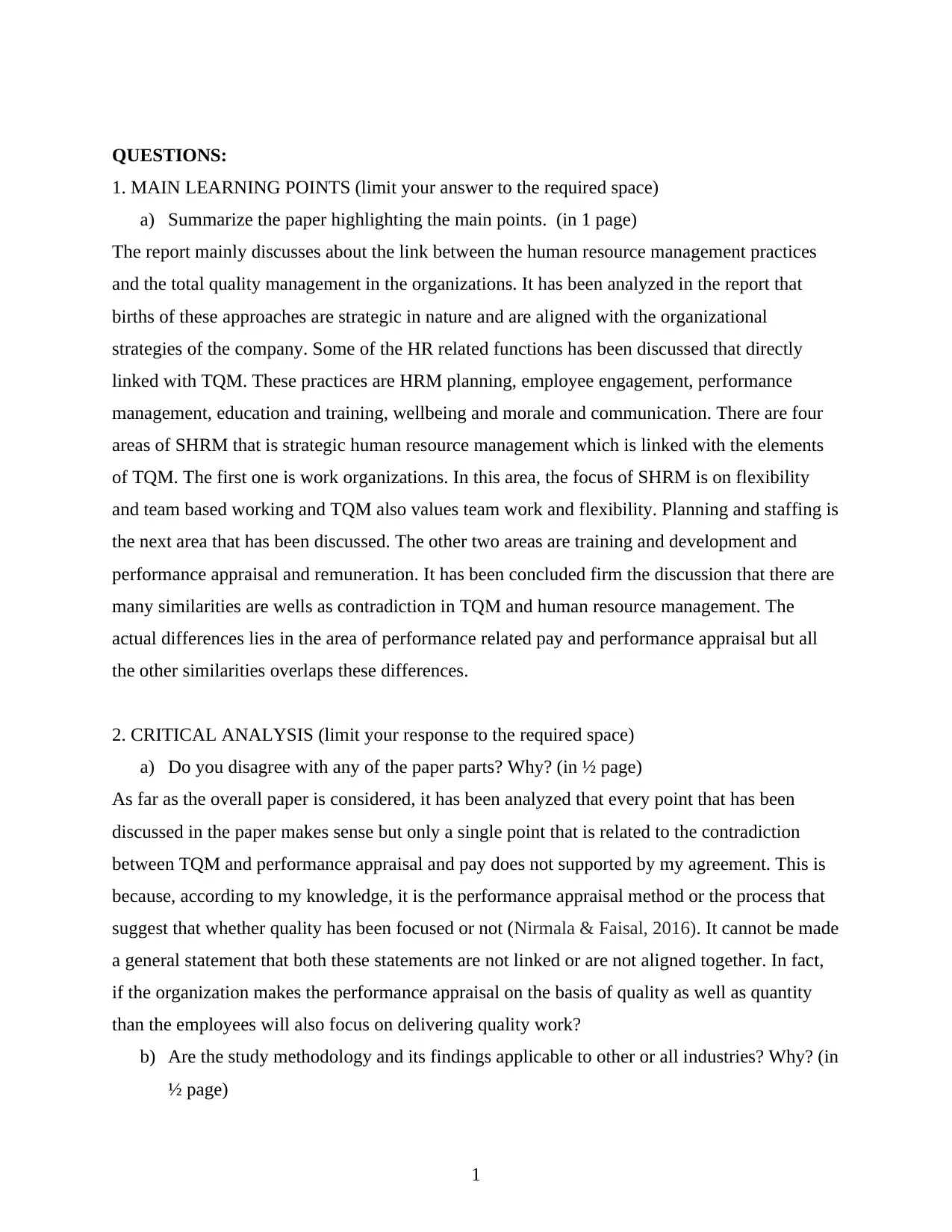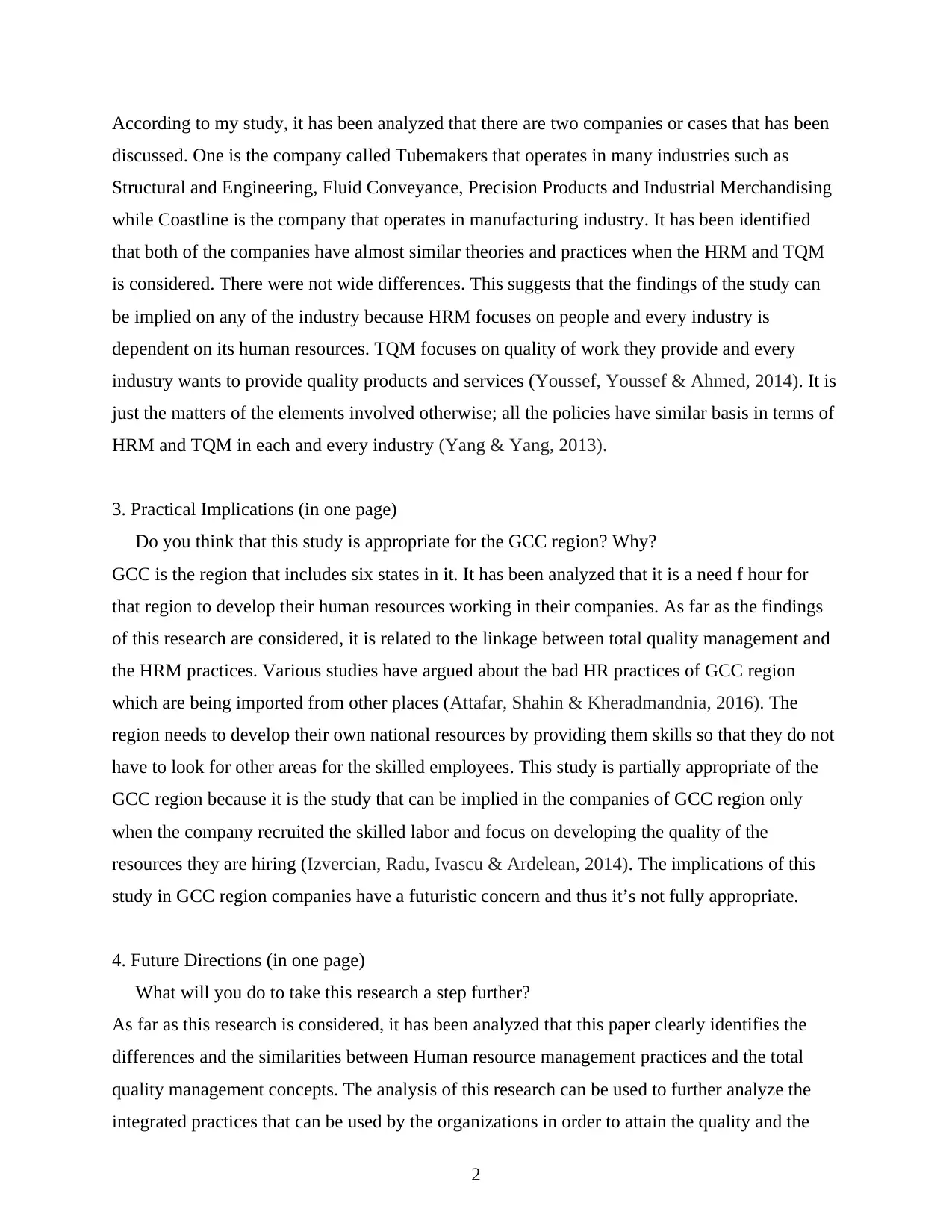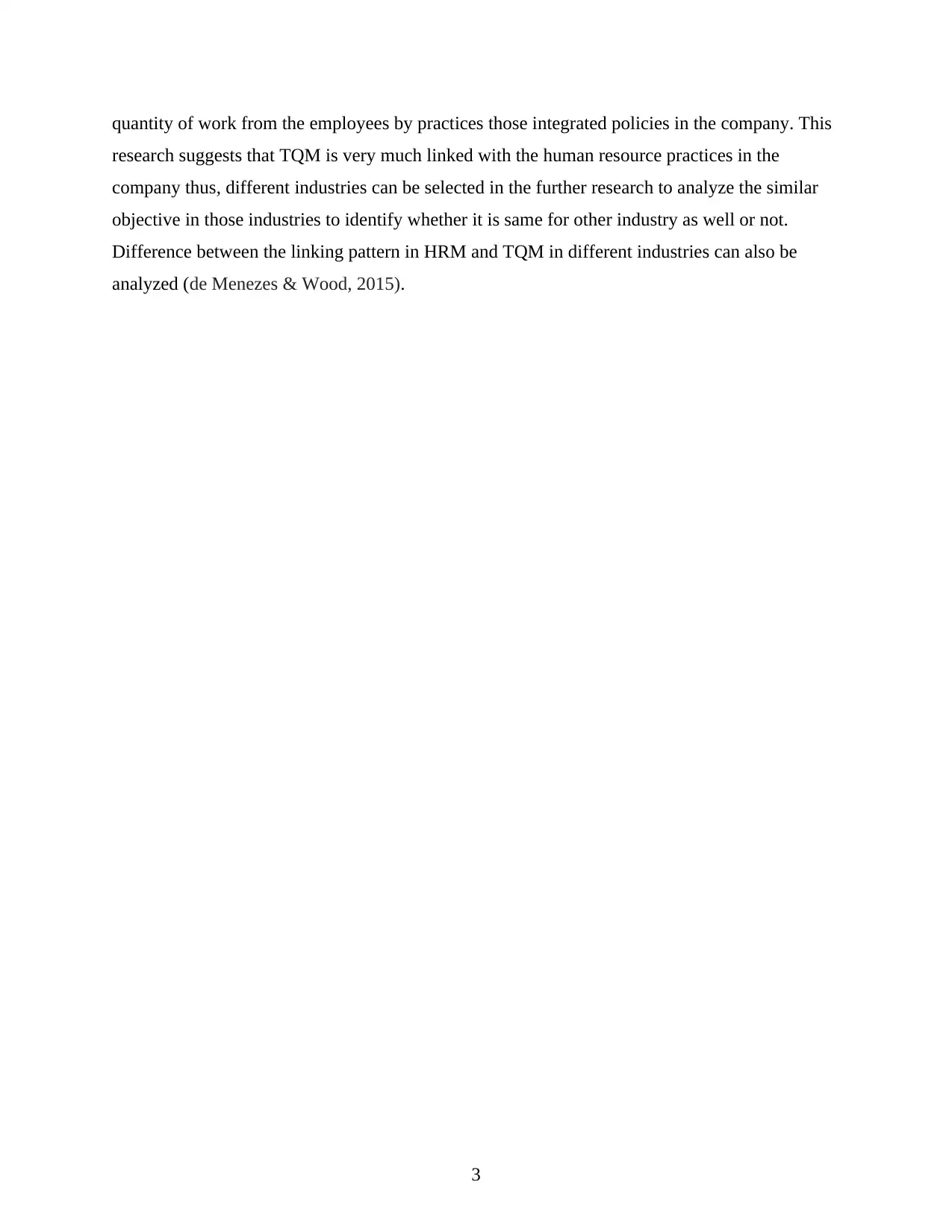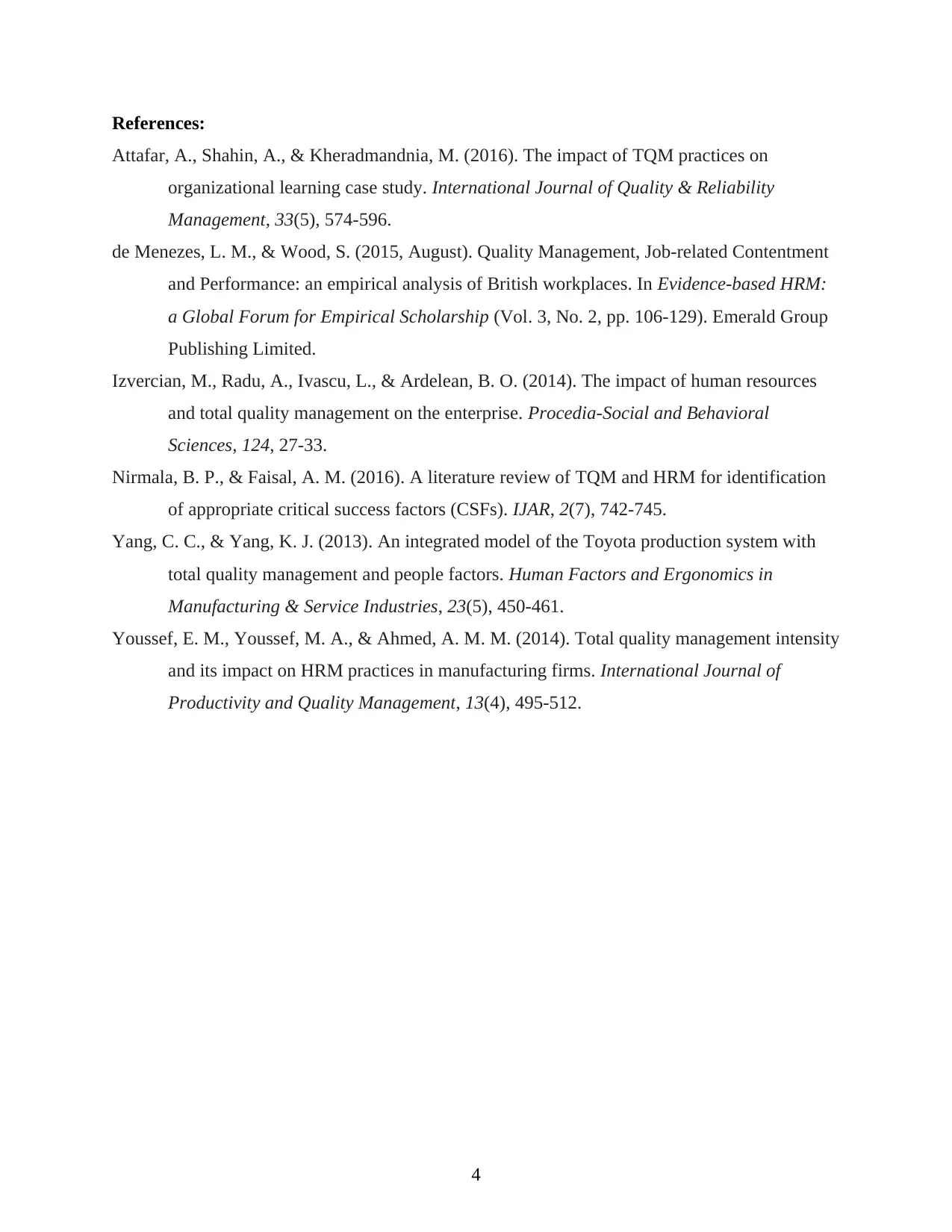Analyzing the Impact of TQM on HRM: A Comprehensive Report
VerifiedAdded on 2020/05/04
|5
|1295
|78
Report
AI Summary
This report delves into the intricate relationship between Total Quality Management (TQM) and Human Resource Management (HRM) within organizations. It summarizes the key learning points, focusing on the strategic alignment of HRM practices like planning, engagement, performance management, training, and communication with TQM principles. The analysis includes a critical examination of the paper's arguments, particularly the contradiction between TQM and performance appraisal, and assesses the applicability of the study's methodology and findings across different industries, highlighting the importance of human resources in achieving quality. The report further explores the practical implications of the study for the GCC region, emphasizing the need for developing skilled national resources, and suggests future research directions, such as analyzing integrated practices for enhancing quality and quantity of work and comparing linking patterns in HRM and TQM across diverse industries. The report is based on the study of two companies Tubemakers and Coastline.

TOTAL QUALITY MANAGEMENT
Paraphrase This Document
Need a fresh take? Get an instant paraphrase of this document with our AI Paraphraser

QUESTIONS:
1. MAIN LEARNING POINTS (limit your answer to the required space)
a) Summarize the paper highlighting the main points. (in 1 page)
The report mainly discusses about the link between the human resource management practices
and the total quality management in the organizations. It has been analyzed in the report that
births of these approaches are strategic in nature and are aligned with the organizational
strategies of the company. Some of the HR related functions has been discussed that directly
linked with TQM. These practices are HRM planning, employee engagement, performance
management, education and training, wellbeing and morale and communication. There are four
areas of SHRM that is strategic human resource management which is linked with the elements
of TQM. The first one is work organizations. In this area, the focus of SHRM is on flexibility
and team based working and TQM also values team work and flexibility. Planning and staffing is
the next area that has been discussed. The other two areas are training and development and
performance appraisal and remuneration. It has been concluded firm the discussion that there are
many similarities are wells as contradiction in TQM and human resource management. The
actual differences lies in the area of performance related pay and performance appraisal but all
the other similarities overlaps these differences.
2. CRITICAL ANALYSIS (limit your response to the required space)
a) Do you disagree with any of the paper parts? Why? (in ½ page)
As far as the overall paper is considered, it has been analyzed that every point that has been
discussed in the paper makes sense but only a single point that is related to the contradiction
between TQM and performance appraisal and pay does not supported by my agreement. This is
because, according to my knowledge, it is the performance appraisal method or the process that
suggest that whether quality has been focused or not (Nirmala & Faisal, 2016). It cannot be made
a general statement that both these statements are not linked or are not aligned together. In fact,
if the organization makes the performance appraisal on the basis of quality as well as quantity
than the employees will also focus on delivering quality work?
b) Are the study methodology and its findings applicable to other or all industries? Why? (in
½ page)
1
1. MAIN LEARNING POINTS (limit your answer to the required space)
a) Summarize the paper highlighting the main points. (in 1 page)
The report mainly discusses about the link between the human resource management practices
and the total quality management in the organizations. It has been analyzed in the report that
births of these approaches are strategic in nature and are aligned with the organizational
strategies of the company. Some of the HR related functions has been discussed that directly
linked with TQM. These practices are HRM planning, employee engagement, performance
management, education and training, wellbeing and morale and communication. There are four
areas of SHRM that is strategic human resource management which is linked with the elements
of TQM. The first one is work organizations. In this area, the focus of SHRM is on flexibility
and team based working and TQM also values team work and flexibility. Planning and staffing is
the next area that has been discussed. The other two areas are training and development and
performance appraisal and remuneration. It has been concluded firm the discussion that there are
many similarities are wells as contradiction in TQM and human resource management. The
actual differences lies in the area of performance related pay and performance appraisal but all
the other similarities overlaps these differences.
2. CRITICAL ANALYSIS (limit your response to the required space)
a) Do you disagree with any of the paper parts? Why? (in ½ page)
As far as the overall paper is considered, it has been analyzed that every point that has been
discussed in the paper makes sense but only a single point that is related to the contradiction
between TQM and performance appraisal and pay does not supported by my agreement. This is
because, according to my knowledge, it is the performance appraisal method or the process that
suggest that whether quality has been focused or not (Nirmala & Faisal, 2016). It cannot be made
a general statement that both these statements are not linked or are not aligned together. In fact,
if the organization makes the performance appraisal on the basis of quality as well as quantity
than the employees will also focus on delivering quality work?
b) Are the study methodology and its findings applicable to other or all industries? Why? (in
½ page)
1

According to my study, it has been analyzed that there are two companies or cases that has been
discussed. One is the company called Tubemakers that operates in many industries such as
Structural and Engineering, Fluid Conveyance, Precision Products and Industrial Merchandising
while Coastline is the company that operates in manufacturing industry. It has been identified
that both of the companies have almost similar theories and practices when the HRM and TQM
is considered. There were not wide differences. This suggests that the findings of the study can
be implied on any of the industry because HRM focuses on people and every industry is
dependent on its human resources. TQM focuses on quality of work they provide and every
industry wants to provide quality products and services (Youssef, Youssef & Ahmed, 2014). It is
just the matters of the elements involved otherwise; all the policies have similar basis in terms of
HRM and TQM in each and every industry (Yang & Yang, 2013).
3. Practical Implications (in one page)
Do you think that this study is appropriate for the GCC region? Why?
GCC is the region that includes six states in it. It has been analyzed that it is a need f hour for
that region to develop their human resources working in their companies. As far as the findings
of this research are considered, it is related to the linkage between total quality management and
the HRM practices. Various studies have argued about the bad HR practices of GCC region
which are being imported from other places (Attafar, Shahin & Kheradmandnia, 2016). The
region needs to develop their own national resources by providing them skills so that they do not
have to look for other areas for the skilled employees. This study is partially appropriate of the
GCC region because it is the study that can be implied in the companies of GCC region only
when the company recruited the skilled labor and focus on developing the quality of the
resources they are hiring (Izvercian, Radu, Ivascu & Ardelean, 2014). The implications of this
study in GCC region companies have a futuristic concern and thus it’s not fully appropriate.
4. Future Directions (in one page)
What will you do to take this research a step further?
As far as this research is considered, it has been analyzed that this paper clearly identifies the
differences and the similarities between Human resource management practices and the total
quality management concepts. The analysis of this research can be used to further analyze the
integrated practices that can be used by the organizations in order to attain the quality and the
2
discussed. One is the company called Tubemakers that operates in many industries such as
Structural and Engineering, Fluid Conveyance, Precision Products and Industrial Merchandising
while Coastline is the company that operates in manufacturing industry. It has been identified
that both of the companies have almost similar theories and practices when the HRM and TQM
is considered. There were not wide differences. This suggests that the findings of the study can
be implied on any of the industry because HRM focuses on people and every industry is
dependent on its human resources. TQM focuses on quality of work they provide and every
industry wants to provide quality products and services (Youssef, Youssef & Ahmed, 2014). It is
just the matters of the elements involved otherwise; all the policies have similar basis in terms of
HRM and TQM in each and every industry (Yang & Yang, 2013).
3. Practical Implications (in one page)
Do you think that this study is appropriate for the GCC region? Why?
GCC is the region that includes six states in it. It has been analyzed that it is a need f hour for
that region to develop their human resources working in their companies. As far as the findings
of this research are considered, it is related to the linkage between total quality management and
the HRM practices. Various studies have argued about the bad HR practices of GCC region
which are being imported from other places (Attafar, Shahin & Kheradmandnia, 2016). The
region needs to develop their own national resources by providing them skills so that they do not
have to look for other areas for the skilled employees. This study is partially appropriate of the
GCC region because it is the study that can be implied in the companies of GCC region only
when the company recruited the skilled labor and focus on developing the quality of the
resources they are hiring (Izvercian, Radu, Ivascu & Ardelean, 2014). The implications of this
study in GCC region companies have a futuristic concern and thus it’s not fully appropriate.
4. Future Directions (in one page)
What will you do to take this research a step further?
As far as this research is considered, it has been analyzed that this paper clearly identifies the
differences and the similarities between Human resource management practices and the total
quality management concepts. The analysis of this research can be used to further analyze the
integrated practices that can be used by the organizations in order to attain the quality and the
2
⊘ This is a preview!⊘
Do you want full access?
Subscribe today to unlock all pages.

Trusted by 1+ million students worldwide

quantity of work from the employees by practices those integrated policies in the company. This
research suggests that TQM is very much linked with the human resource practices in the
company thus, different industries can be selected in the further research to analyze the similar
objective in those industries to identify whether it is same for other industry as well or not.
Difference between the linking pattern in HRM and TQM in different industries can also be
analyzed (de Menezes & Wood, 2015).
3
research suggests that TQM is very much linked with the human resource practices in the
company thus, different industries can be selected in the further research to analyze the similar
objective in those industries to identify whether it is same for other industry as well or not.
Difference between the linking pattern in HRM and TQM in different industries can also be
analyzed (de Menezes & Wood, 2015).
3
Paraphrase This Document
Need a fresh take? Get an instant paraphrase of this document with our AI Paraphraser

References:
Attafar, A., Shahin, A., & Kheradmandnia, M. (2016). The impact of TQM practices on
organizational learning case study. International Journal of Quality & Reliability
Management, 33(5), 574-596.
de Menezes, L. M., & Wood, S. (2015, August). Quality Management, Job-related Contentment
and Performance: an empirical analysis of British workplaces. In Evidence-based HRM:
a Global Forum for Empirical Scholarship (Vol. 3, No. 2, pp. 106-129). Emerald Group
Publishing Limited.
Izvercian, M., Radu, A., Ivascu, L., & Ardelean, B. O. (2014). The impact of human resources
and total quality management on the enterprise. Procedia-Social and Behavioral
Sciences, 124, 27-33.
Nirmala, B. P., & Faisal, A. M. (2016). A literature review of TQM and HRM for identification
of appropriate critical success factors (CSFs). IJAR, 2(7), 742-745.
Yang, C. C., & Yang, K. J. (2013). An integrated model of the Toyota production system with
total quality management and people factors. Human Factors and Ergonomics in
Manufacturing & Service Industries, 23(5), 450-461.
Youssef, E. M., Youssef, M. A., & Ahmed, A. M. M. (2014). Total quality management intensity
and its impact on HRM practices in manufacturing firms. International Journal of
Productivity and Quality Management, 13(4), 495-512.
4
Attafar, A., Shahin, A., & Kheradmandnia, M. (2016). The impact of TQM practices on
organizational learning case study. International Journal of Quality & Reliability
Management, 33(5), 574-596.
de Menezes, L. M., & Wood, S. (2015, August). Quality Management, Job-related Contentment
and Performance: an empirical analysis of British workplaces. In Evidence-based HRM:
a Global Forum for Empirical Scholarship (Vol. 3, No. 2, pp. 106-129). Emerald Group
Publishing Limited.
Izvercian, M., Radu, A., Ivascu, L., & Ardelean, B. O. (2014). The impact of human resources
and total quality management on the enterprise. Procedia-Social and Behavioral
Sciences, 124, 27-33.
Nirmala, B. P., & Faisal, A. M. (2016). A literature review of TQM and HRM for identification
of appropriate critical success factors (CSFs). IJAR, 2(7), 742-745.
Yang, C. C., & Yang, K. J. (2013). An integrated model of the Toyota production system with
total quality management and people factors. Human Factors and Ergonomics in
Manufacturing & Service Industries, 23(5), 450-461.
Youssef, E. M., Youssef, M. A., & Ahmed, A. M. M. (2014). Total quality management intensity
and its impact on HRM practices in manufacturing firms. International Journal of
Productivity and Quality Management, 13(4), 495-512.
4
1 out of 5
Related Documents
Your All-in-One AI-Powered Toolkit for Academic Success.
+13062052269
info@desklib.com
Available 24*7 on WhatsApp / Email
![[object Object]](/_next/static/media/star-bottom.7253800d.svg)
Unlock your academic potential
Copyright © 2020–2026 A2Z Services. All Rights Reserved. Developed and managed by ZUCOL.





